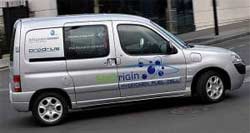PSA Peugeot Citroën and electronics company Intelligent Energy have presented the results of their three-year efforts to integrate a fuel cell into a battery-powered urban delivery van.
It's based on a Peugeot Partner Origin van with a 10kW hydrogen-powered fuel cell to charge its batteries that's small enough to fit under the bonnet and trebles its range to 300km.
The fuel cell generates electricity as the vehicle travels.
It can be started at -20° and operated at up to 37° thanks to heating and cooling systems. Its only emission is water – which freezes at 0° and blocks the system
The fuel cell even has a built-in DC-DC converter and regulator so it's a self-contained "hydrogen in – electricity out" energy source, pushing out 100 amperes of direct current at 100 – 200V, which is used to charge the van's batteries rather than drive its 180V, 35kW electric motor.
The hydrogen is stored at 70MPa (about 350 times the pressure in your car's tyres) in pre-filled stainless-steel cylinders sheathed in carbon-fibre – similar to the tanks used by scuba divers and built to the same standards – on a sliding rack under the floor of the van's load area.
The advantage is that an empty rack is simply exchanged for a full one, rather than refuelling the vehicle at a hydrogen storage station.
The tanks are also much stronger than a fixed tank would be and, since they are designed to be removed, will not leak even if the rack is destroyed in an accident.

